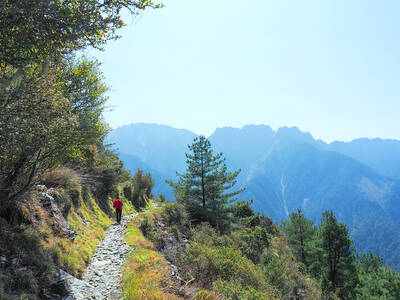The managers of the Old Summer Palace in Beijing, looted by British and French troops in the 19th century, are threatening legal action over a Chinese movie studio’s sprawling US$5 billion replica, state media said.
In 2007, Hengdian World Studios, the world’s largest outdoor film studio, announced it planned to build a multi-billion-dollar replica of Beijing’s Old Summer Palace at its headquarters some 1,500km south of the Chinese capital.
The 18th-century original in Beijing’s northwest served as a retreat for China’s emperors, with lavish gardens, fountains and pavilions, but was pillaged by British and French troops in 1860 during the Second Opium War.

Photo: AFP/ Ed Jones
The event has long been regarded as one of the most humiliating episodes of Chinese history, and Communist authorities stress it as an example of the country’s victimization by foreign powers.
Parts of the new version are finally scheduled to open next month, but the project has been sharply criticized by the stewards of the former imperial complex, who said that the 990-acre site is “unique and cannot be replicated.”
“The construction and development of the site should be planned by authoritative national organizations, and any replication of it should reach certain standards,” the palace’s administrative office told China’s official Xinhua news agency Sunday.
Xinhua said potential legal action centered on intellectual property rights, without giving details.
Hengdian founder Xu Wenrong defended the project, telling the agency that it was an effort to educate China’s younger generation about China’s past rather than simply build a reproduction of the site.
Hengdian World Studios has already built a full-scale replica of Beijing’s Forbidden City. Yet the Old Summer Palace, or Yuanmingyuan, project has attracted controversy due to its place in Chinese history.
The destruction was in response to China’s capture, torture and killing of members of a British and French delegation. Beijing has waged a persistent campaign to retrieve 1.5 million relics it estimates were taken from the imperial complex at the time.
‘WRITTEN IN BLOOD’
When the film studio announced the project in 2007, experts and others were sharply critical, arguing the money would be better spent preserving surviving cultural relics than recreating long-lost ones.
“The replica is unnecessary because the Yuanmingyuan was destroyed by the Allied forces and the present day ruins serve as a testimony to that period of humiliating history,” cultural relics expert Ruan Yisan had told Xinhua.
In the wake of the latest row, some in China rallied to defend the movie studio, arguing that the project will strengthen public understanding of China’s history.
“The Old Summer Palace was built at the cost of the whole nation but open to the royal family only; if the recreation in the movie town opens to the public, it will help more people know about our history and engage with the past,” said Yang Jianhua, a researcher at Zhejiang Academy of Social Sciences, according to the China Daily.
On China’s popular online social networks, some users called the Old Summer Palace’s claims laughable.
“Historical relics have no ‘intellectual property’ rights,” wrote one user of Sina Weibo, a Chinese version of Twitter, on Monday. “If you carve a statue of Confucius, Washington, or any other figure from hundreds or thousands of years ago, is that a violation of their rights?”
Others called for the new project to be halted.
“I think they shouldn’t rebuild it,” a Sina Weibo user wrote. “That history is written in blood. A dilapidated Yuanmingyuan is better able to remind us of that humiliating chapter of history.”

“Why does Taiwan identity decline?”a group of researchers lead by University of Nevada political scientist Austin Wang (王宏恩) asked in a recent paper. After all, it is not difficult to explain the rise in Taiwanese identity after the early 1990s. But no model predicted its decline during the 2016-2018 period, they say. After testing various alternative explanations, Wang et al argue that the fall-off in Taiwanese identity during that period is related to voter hedging based on the performance of the Democratic Progressive Party (DPP). Since the DPP is perceived as the guardian of Taiwan identity, when it performs well,

The Taiwan People’s Party (TPP) on May 18 held a rally in Taichung to mark the anniversary of President William Lai’s (賴清德) inauguration on May 20. The title of the rally could be loosely translated to “May 18 recall fraudulent goods” (518退貨ㄌㄨㄚˋ!). Unlike in English, where the terms are the same, “recall” (退貨) in this context refers to product recalls due to damaged, defective or fraudulent merchandise, not the political recalls (罷免) currently dominating the headlines. I attended the rally to determine if the impression was correct that the TPP under party Chairman Huang Kuo-Chang (黃國昌) had little of a

At Computex 2025, Nvidia CEO Jensen Huang (黃仁勳) urged the government to subsidize AI. “All schools in Taiwan must integrate AI into their curricula,” he declared. A few months earlier, he said, “If I were a student today, I’d immediately start using tools like ChatGPT, Gemini Pro and Grok to learn, write and accelerate my thinking.” Huang sees the AI-bullet train leaving the station. And as one of its drivers, he’s worried about youth not getting on board — bad for their careers, and bad for his workforce. As a semiconductor supply-chain powerhouse and AI hub wannabe, Taiwan is seeing

Jade Mountain (玉山) — Taiwan’s highest peak — is the ultimate goal for those attempting a through-hike of the Mountains to Sea National Greenway (山海圳國家綠道), and that’s precisely where we’re headed in this final installment of a quartet of articles covering the Greenway. Picking up the trail at the Tsou tribal villages of Dabang and Tefuye, it’s worth stocking up on provisions before setting off, since — aside from the scant offerings available on the mountain’s Dongpu Lodge (東埔山莊) and Paiyun Lodge’s (排雲山莊) meal service — there’s nowhere to get food from here on out. TEFUYE HISTORIC TRAIL The journey recommences with